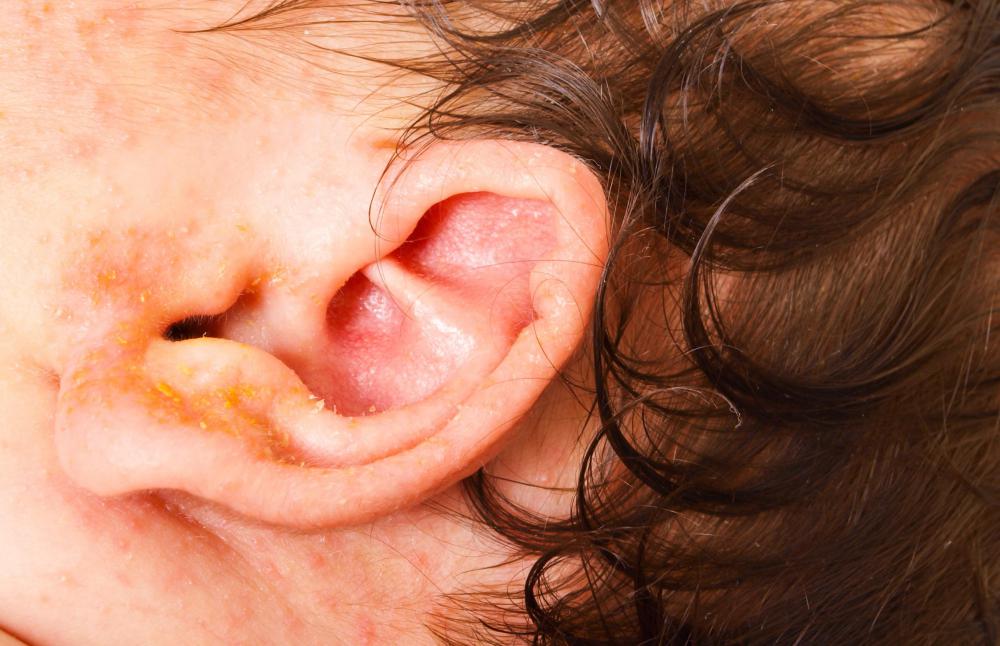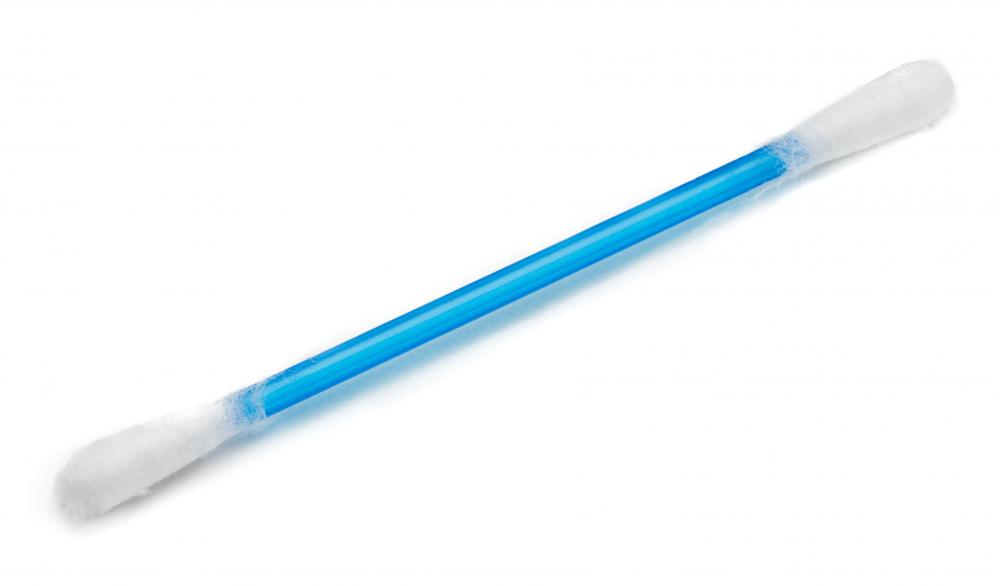At WiseGEEK, we're committed to delivering accurate, trustworthy information. Our expert-authored content is rigorously fact-checked and sourced from credible authorities. Discover how we uphold the highest standards in providing you with reliable knowledge.
What is Swimmer's Ear?
Swimmer's ear is an infection of the outer ear, which can sometime evolve into middle ear (otitis media) infections. Typically when the condition is present alone it is called otitis externa because it involves infection of the outer part of the ear canal, and can even cause irritation of the skin on the external or visible part of the ear. While some people may only notice pain, usually in a single ear, others may have red, irritated or itching skin on the outside of the ear.
Generally, the ear is resistant to infections when liquid, like water, is introduced to it. Most of the water simply rolls out of the ear, though people may go through a few minutes to a couple of hours of feeling like the ear is plugged with water. In some cases, especially when a lot of water has been introduced into the ear through activities like swimming, the moisture from this additional water can cause bacteria or fungi to grow. Hence the term swimmer's ear is used to describe the condition, even though you don’t always get it from swimming.

Symptoms of swimmer's ear can include minor to extreme pain. In particular, you might notice if you touch or move the ear that it really hurts. Your outer ear may itch or appear red, and you may feel like the ear is full of water. Some people experience difficulty hearing out of the affected ear, and others may notice a small amount of pus draining from the ear.

Many people may never get swimmer's ear, which can be caused by a number of different factors. Again, it isn’t always related to swimming, but when it is, one of two conditions may be present. The water you swim in can be contaminated with bacteria, which can create the condition, or in other cases, simply too much exposure to water in the ears brings on the infection. Children are particularly prone to swimmer’s ear, and people with conditions like eczema may also be more likely to get the condition. If you have a lot of waxy buildup in your ears this can trap moisture, making bacterial infection more likely.

Another type of otitis externa is unrelated to swimming. If you clean your ear with cotton tipped sticks, part of the cotton can break off and create swimmer's ear. You should never clean anything but the exterior of the ear with things like Q-tips® in any case. Severe damage to the eardrum can occur if you insert small objects in the ear.
Swimmer’s ear is usually diagnosed by examination with an otoscope. Some doctors may take cultures of the ear to confirm infection, but in most cases this is not done. For simple otitis externa, medicated drops are usually prescribed, which help resolve the condition in a few days to a few weeks. If the middle ear has become infected, a doctor may also prescribe oral antibiotics.

It’s better to prevent swimmer’s ear than to have to suffer the pain of the condition and to pay for treatment. You can buy earplugs designed to keep water from getting into the ears during extensive swimming. You should also practice wax removal cleaning if you have a lot of earwax build-up. After swimming or taking a bath, dry the ear’s exterior, but don’t use Q-tips® to dry the interior of the ear. Some people prefer to use alcohol-based drops like Swim-Ear®:, which can help create greater evaporation of any water trapped in the ear.

If you do get chronic ear infections, it’s a good idea to talk with your doctor about other prevention strategies. Further if you note the signs of swimmer’s ear, especially if this is the first time it has occurred, see a doctor for diagnosis. Some people get the condition fairly regularly and always have drops on hand should the condition develop. Others only get the condition on rare occasions, and a few lucky people never get it. In any case, unless you are chronically affected by these infections, do see a doctor for correct diagnosis if the above symptoms develop, even if you haven’t been swimming.
AS FEATURED ON:
AS FEATURED ON:















Discussion Comments
One thing that I've always found to be a good home treatment for swimmer's ear is a few drops of tea tree oil and olive oil. You can just mix equal amounts together, and put it in the ear a few times a day.
It feels nicer when you heat it up, but you can also just put it in your ears cold. If you do heat it up though, make sure it's not too hot -- you don't want to burn your ear!
Also, after you put it in your ears, make sure to put some cotton balls in your ears to keep the liquid from coming out.
Does anybody know if fluid in the ear could cause an ear infection leading to hearing loss? I have a friend who swims a lot, but she never uses ear blocks, and now she's having trouble with her hearing -- she's only 23, so it's unlikely to be age-related.
Is this likely, or even possible? She's going to an ENT next month, but we're just trying to find as much information as we can before her appointment.
Can anybody tell me more information about this? And if so what would be the treatment for an ear infection in adults that leads to hearing loss?
Ooh -- I never knew that fluid in the ears could lead to fungi in your ear! That makes an already unpleasant condition even grosser to think about. I am definitely going to stock up on some swimmer's ear drops before I go swimming again.
It is much easier to prevent swimmer's ear then to treat it. After swimming try to remove any trapped water by shaking your head. Also drying the ear after swimming might control the problem. Those who swim regularly might want to use ear drops prescribed by a doctor. The drops change the alkali and/or acid level in the ear.
Post your comments